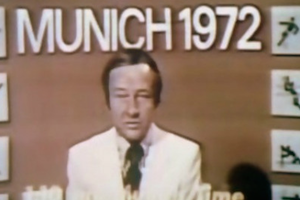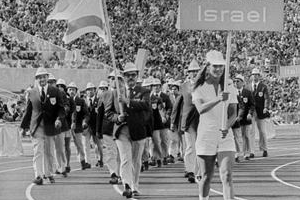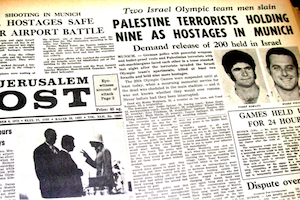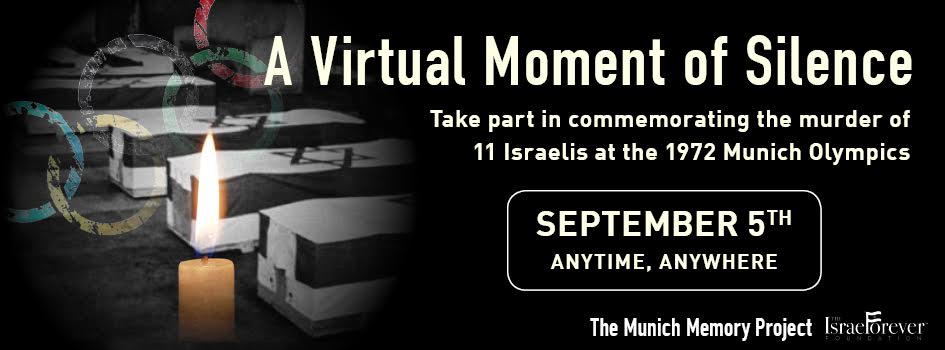From ABC to Israel: Hopeful Memories of Munich
By Irene Rabinowitz
When you are twenty-four years old and living in New York City, it is exciting to be working at a television network even in a dull job as a benefits clerk in the personnel department. The coolest people worked in the art department or the only broadcast section of ABC that garnered respect in those days which was the sports division.
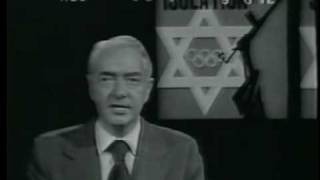
The biggest stars were the cast of Dark Shadows, a vampire soap opera that got cancelled in 1971, drawing fang wearing protestors outside of the corporate headquarters, and Lancelot Link, Secret Chimp, a Saturday morning kid show that also left the airwaves in 1971. The jokes about the “almost broadcasting company” rolled off of the backs of us lowly employees, but I am sure that the higher ups hated it. We joked that the employee cafeteria was also third rate and many of us snuck into the cafeteria at “Black Rock”, the nickname of the CBS building next door to ABC on Sixth Avenue (Avenue of the Americas). People smoked pot in the bathrooms and drank three martini lunches at the Channel Seven bar around the corner. It was the seventies.
ABC’s other star was Howard Cosell, the crusty sports guy who hung out with Muhammad Ali when he was still Cassius Clay and who was known for letting the words go straight from his brain to his mouth without a filter. ABC’s sports coverage was a shining light and the network invested heavily to make sure that coverage of the 1972 Olympics would be the best possible. Jim McKay had been the host of ABC’s Wide World of Sports for over ten years already when he went to Munich to anchor the Olympics.
As the Olympics started during the last week in August, we would often go into the conference room where there was a television (set permanently on the local ABC affiliate) and watch some of the competitions. It was the Olympics of Mark Spitz, a Jewish American super swimmer who won seven gold medals. We cheered him on in the crowded conference room. At that point, the Olympics seemed to be a great success for ABC. A friend who worked in the executive offices told me that ABC’s president Leonard Goldenson was pleased with the coverage and had been cheering Mark Spitz on, something American Jews were doing everywhere.
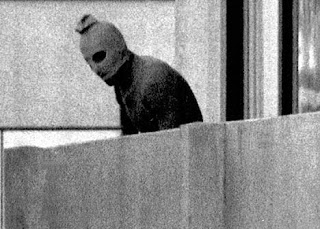
Failure: Armed police drop into position on a terrace directly above the apartments. But they did not try and rescue the hostages
Copyright © AP
Then it changed. With only six days left before the closing ceremony, Black September terrorists entered the section of the Olympic Village and took Israeli athletes and coaches hostage. The news at first was confusing; although those of us not working in the broadcast departments were not privy to the early facts, we sat in front of those televisions on each floor hoping that there would be a rescue that saved all eleven Israelis. After a short time, employees were told about the facts on the ground and that Jim McKay, the anchor for ABC’s Olympics Coverage, would stay on the air switching to the role of a newsman. And so he did, for a remarkable fourteen hours without a break.
Employees stayed glued to the television sets and were allowed to stay as long as we wanted past the normal office closing time. Clerks, secretaries, vice presidents, department directors….we all gathered around the televisions together. The hierarchal lines that exist in corporate culture disappeared as we watched Jim McKay continue, without a break, to report on what turned out to be a warning of things to come. A botched rescue and eleven Israeli lives gone. Employees were told about the failed rescue attempt and the deaths just before it was announced. You could feel the oxygen being pulled out of the room I was in, and I imagine in other rooms, as we watched in our tiny groups throughout the building, Jim McKay’s statement:
“When I was a kid my father used to say ‘Our greatest hopes and our worst fears are seldom realized.’ Our worst fears have been realized tonight. They have now said there were 11 hostages; two were killed in their rooms yesterday morning, nine were killed at the airport tonight. They're all gone.”
The televisions stayed on in the conference rooms for a few days as the Olympics continued which became a topic of dispute, not only at ABC, but around the world. Like many, I could not watch. For many American Jews, the headiness of Mark Spitz (who left before the end of the games due to concerns that he would be a target) was lost to the horror of terrorism. To this day, many believe that the Israeli athletes and coaches who died have not yet been honored appropriately by the Olympic Committee.
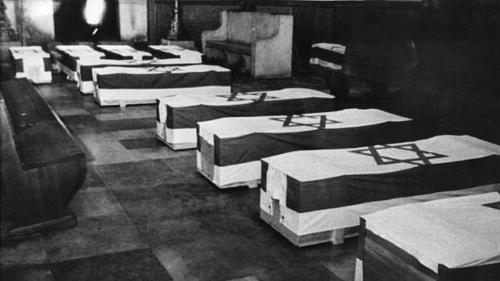
I left ABC before the end of 1972. A ban on cigarette advertising had been enacted in early 1971 and we knew that lay-offs would occur and would not be directed at “talent”. I was laid off, a lowly clerk working on pension tables for the workers in ABC owned movie theaters in the South who worked for minimum wage. I was surely dispensable. But I left with no regrets. I felt privileged to be a witness to history. As an American Jew who worked for a company headed by a philanthropic Jewish broadcasting genius, Leonard Goldenson, I was proud of ABC’s coverage and surely of Jim McKay’s professionalism and compassion.
Now, forty-three years later, living in Israel, the word Munich evokes for me photos of hooded terrorists on a balcony who joined a cycle of violence and death that continues to this day. But the evil acts of Black September will not stop me from looking at the photos of eleven Israelis and remembering these men who proudly and hopefully went to Germany to represent their nation. For them, we have to remain hopeful.

